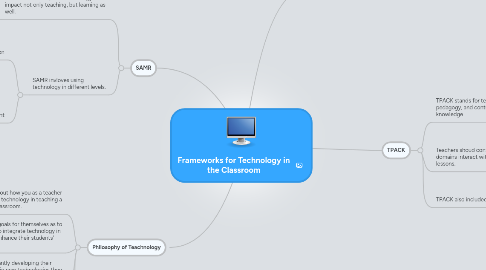
1. Philosophy of Teachnology
1.1. This is the belief about how you as a teacher can and should use technology in teaching a lesson and in the classroom.
1.2. Teachers should set goals for themselves as to how they are going to integrate technology in their classrooms to enhance their students' learning.
1.3. Teachers can be constantly developing their philosophy and adding in new technologies they have discovered
1.4. Technologies should be implemented to enhance learning
2. TPACK
2.1. TPACK stands for technology, pedagogy, and content knowledge
2.1.1. Technological Knowledge: Knowing which tools can be used in teaching, and how they can be used.
2.1.2. Pedagogical Knowledge: How to teach.
2.1.3. Content Knowledge: Subject area
2.2. Teachers shoud consider how these three domains interact with each other for lessons.
2.2.1. Pedagogical Content Knowledge
2.2.2. Technological Content Knowledge
2.2.3. Technological Pedagogical Knowledge
2.3. TPACK also included PCK, TCK, and TPK.
2.3.1. Pedagogical Content Knowledge
2.3.2. Technological Content Knowledge
2.3.3. Technological Pedagogical Knowledge
3. SAMR
3.1. Involves how computer technology can impact not only teaching, but learning as well.
3.1.1. Detail 1
3.1.2. Detail 2
3.2. SAMR invloves using technology in different levels.
3.2.1. Transformation
3.2.1.1. Redefinition: using computers for something that couldn't have been done before.
3.2.1.2. Modification: computer technology is used to accomplish common classroom tasks; enhancing the classroom.
3.2.2. Enhancement
3.2.2.1. Augmentation: using technology tools to effectively perform common tasks.
3.2.2.2. Substitution: using computer technology to do a task that could also be done without a computer.
4. 21st Century Learning
4.1. Consists of 3 different types of knowledge
4.1.1. Foundational Knowledge: content, digital and information literacy, and information across different disciplines
4.1.2. Meta Knowledge: Includes problem solving and thinking critically, communication and collaborating, as well as creativity
4.1.3. Humanistic Knowledge: Job and life skills, cultural competence, as well as emotional or ethical awareness
